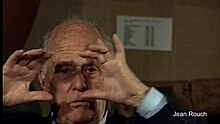Jean Rouch
Jean Rouch (born May 31, 1917 in Paris , † February 18, 2004 in Birni-N'Konni ) was a French ethnologist , cameraman and director.
life and work
Rouch was a student of Marcel Mauss , a member of the Resistance and is considered a master of ethnographic film and the founder of cinéma vérité . Rouch himself, however, stressed how much his approach owed to French-Canadian filmmaker Michel Brault (see quote below).
In 1946 he lost the tripod of his camera while on an expedition on the Niger River in Africa and was forced to use the device as a handheld camera . This is considered to be the beginning of the Cinéma vérité , whose name he also coined.
In his films he deals with upheavals in Africa and Europe, but also gives insights into social life, rituals and the role of myth in societies.
His film Les Maitres Fous from 1954 is famous about a ritual of the Hauka , a religious cult group that was widespread in West Africa at the time. It depicts the cult in which the participants are possessed in a trance by ghosts that represent the former European colonial power , such as the governor general, the engineer, the train driver, etc. The cult tried to deal with the trauma of colonialism .
In the 1960s, Rouch received criticism from leftist groups in France who accused him of lack of ideological commitment and rejected him as a post-colonial lover of African rituals. The African writer and director Ousmane Sembène referred to his work and his point of view with the accusation “You look at us like insects”. For many Songhai on Niger, however, Rouch was seen as a griot who presented his art on a canvas.
The broadcaster WDR dedicated a highly acclaimed series to its films about the Dogon in what is now Mali , made in collaboration with the ethnologist Germaine Dieterlen between 1950 and 1974, entitled Rituals of the Dogon , which was first broadcast in 1998 and repeated in 2000 . It includes nine films in which Rouch and Dieterlen documented the seven-year festival of Sigi between 1966 and 1973 , as well as five other documentaries on Dogon rituals.
The Berlinale presented over the years repeatedly films of Jean Rouch, most recently in 2002 the film Le rêve plus fort que la mort (The dream stronger than death), which in an unfinished version at a packed movie palace Delphi premiered and its audience received the visibly moved director with a standing ovation.
Jean Rouch died on February 18, 2004 in a car accident.
Films (selection)
- Les fils de l'eau (The Sons of the Water), 1950
- Mammy Water (Mamy Wata), 1953-1956
- Les maîtres fous (The Mad Masters), 1954
- Jaguar , 1957-1967
- Chronique d'un été (Chronicle of a Summer), 1960
- Petit à petit , 1969
- Dionysus , 1984
- Enigma , 1986
- Moi fatigué debout, moi couché (Tired Standing Up and Lying Down), 1997
Quote
"Il faut le dire, tout ce que nous avons fait en France dans le domaine du cinéma-vérité vient de l'ONF (Canada). C'est Brault qui a apporté une technique nouvelle de tournage que nous ne connaissions pas et que nous copions tous depuis. D'ailleurs, vraiment, on a la 'needite', ça, c'est sûr; même les gens qui considèrent que Brault est un emmerdeur ou qui étaient jaloux sont forcés de le reconnaître. ”Jean Rouch, June 1963, Cahiers du cinéma , no. 144.
“You have to admit that everything we did in France in the field of cinéma-vérité comes from the ONF ( National Film Board of Canada ). Brault developed a new technique of turning that we did not know and that we have copied ever since. By the way, you really have the Brault virus, that's for sure; even the people who consider Brault to be a pain in the ass or who were jealous are forced to admit it. "
literature
- Paul Henley: The Adventure of the Real: Jean Rouch and the Craft of Ethnographic Cinema , University of Chicago Press 2010, 500 pp.
- Jeff Himpele, Faye Ginsburg: Ciné-Trance: A tribute to Jean Rouch (1917-2004). In: American Anthropologist . Vol. 107, no. 1. 2005, pp. 108-128
- Eva Hohenberger: The Reality of Film: Documentary Film, Ethnographic Film, Jean Rouch . Olms, Hildesheim 1988
- Paul Stoller: The Cinematic Griot. The Ethnography of Jean Rouch. University of Chicago Press, Chicago / London 1992, ISBN 0-226-77546-1
- Julian Vigo: Power / Knowledge and Discourse: Turning the Ethnographic Gaze Around in Jean Rouch's Chronique d'un Ete. Visual Sociology, 1995, pp. 14-38 online at Archive.org
Web links
- Literature by and about Jean Rouch in the catalog of the German National Library
- Jean Rouch in the Internet Movie Database (English)
- Jean Rouch Tribute website. Documentary Educational Resources
- Les Maitres Fous (Mad Masters). Documentary Educational Resources
Individual evidence
- ↑ Rituals of the Dogon - Part 1 , film data on filmdienst.de
- ^ Keyword search Jean Rouch in the archive of the Berlinale , on Berlinale.de
- ↑ The cineast Jean Rouch is dead in L'Obs on February 22, 2004
| personal data | |
|---|---|
| SURNAME | Rouch, Jean |
| BRIEF DESCRIPTION | French director |
| DATE OF BIRTH | May 31, 1917 |
| PLACE OF BIRTH | Paris |
| DATE OF DEATH | February 18, 2004 |
| Place of death | Birni-N'Konni |
